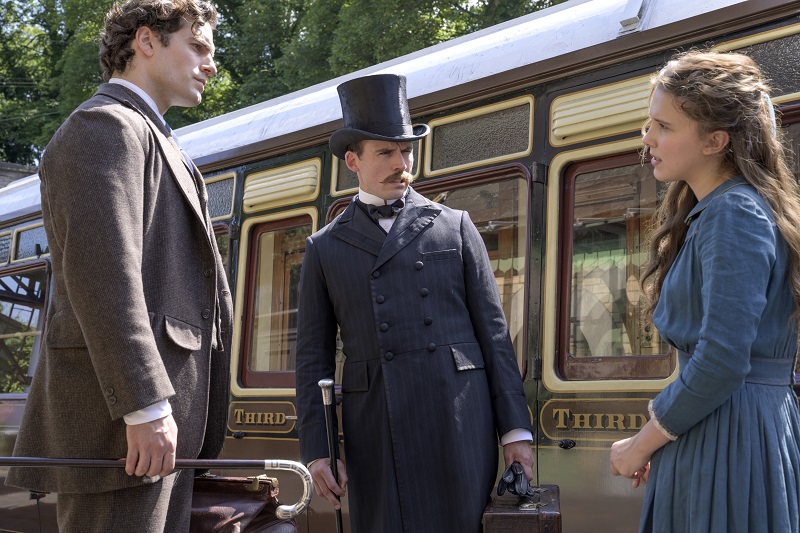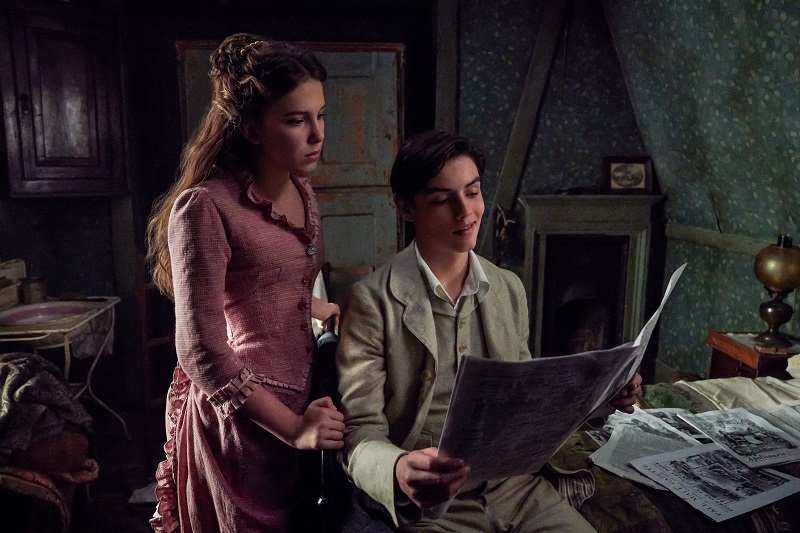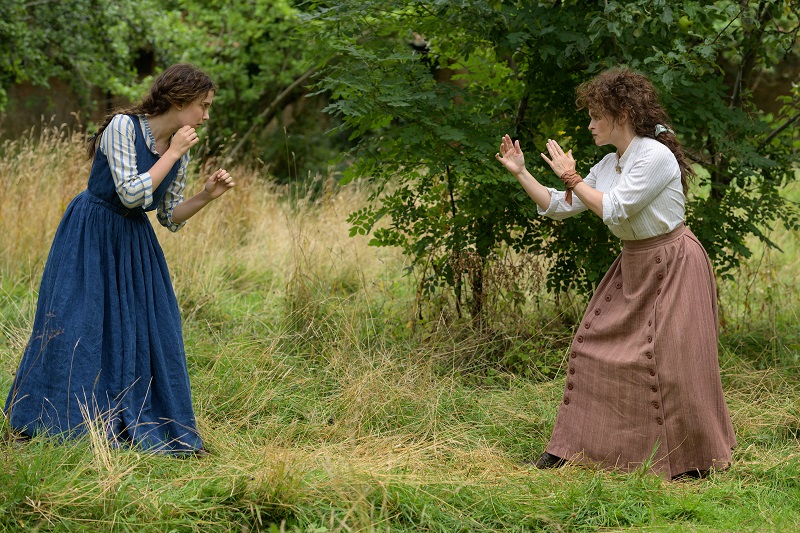There is so much to cherish and adore about Netflix’s Enola Holmes. The story of Sherlock Holmes’ little sister who shares his gift of deduction is simultaneously a standalone film that is a brilliantly righteous mystery firmly with the DNA of Sir Arthur Conan Doyle, and one that leaves us begging for more—translation: May this be the first in a long series!

Millie Bobby Brown (who is the best thing about an extraordinary Stranger Things, also on Netflix), stars as the titular character—and she also serves as one of the film’s producers. From the get-go, this is no 19th-century woman and that is thanks wholly to her mother Mrs. Holmes (Helena Bonham Carter) who raised her to think independently, act independently, and most importantly, never allow herself to be defined by society as it is currently. Everything she’s been taught, plus what she innately has in her genes much like her famous brother Sherlock Holmes (Henry Cavill), has made her a formidable force of nature. That’ll come in handy as her mother disappears yet leaves a slew of clues that only the highly honed eye could spot, like her youngest son and daughter. That older son, Mycroft Holmes, is more concerned about his place in English society and the future of the British isles than he is the welfare of his little sister.
Sixteen-year-old Enola immediately puts some pieces together that her brothers miss, and she better figure something out quickly as Mycroft has arranged for her to go to finishing school in the morning. She and her mother were quite close. Her brothers moved to London when she was just a toddler and for various reasons, they haven’t been around. Mycroft, for his social climbing, and Sherlock—well, we all know why he’s been busy. Enola is distraught that her mother would just abandon her, but she must have had her reasons. Clues are everywhere, one just needs to know where to look. Yes, her brother says that quite often, but Enola lives it.
There is something about the characterization of Enola Holmes that has us almost more endeared to her mystery-solving than her more famous sibling. That is largely due to the script by Jack Thorne and the novel by Nancy Springer, as well as the revelatory performance by Brown. There’s enlivening a character and there is what the Stranger Things breakout has achieved with her 19th-century rebel with a cause.
In the process of searching for her mother, she stumbles onto a dangerous conspiracy that surrounds a young Lord whose future is tied to the future of British politics. Lord Tewksbury (Louis Partridge) fears for his life when his father perishes suddenly, and he inherits the family’s seat. How the young Holmes “runs” into him and their relationship as laid out pitch-perfectly over the course of the film is one of the surprise highlights of a movie experience packed with divine delights.
Brown must have read Springer’s novel and thought, “I’d be perfect for this.” Or someone somewhere discovered the book, brought it to Brown. Who cares how it happened, it is a match made in heaven. The young actress breaks the fourth wall, but not when you expect it, and it is handled in such a way that she has compelled us firmly into the drama and mystery. That works, because audience members are compiling clues all their own, as should be the case with any great mystery—literary or visual. As Enola, Brown has found a character that is fully defined as any young woman in recent movie history. That had to be appealing for the young actress, but also the chance to play a role in a Sherlock Holmes universe where Enola Holmes was in fact the one ahead of the great sleuth. What is just one example of how heartfelt this film is, is at one point, Sherlock learns that his sister has beaten him somewhere (to a clue, perhaps?), he simply smiles. He’s proud of her. It’s something that is lacking from Mycroft—who believes that Enola needs to be “broken and tamed.”
Cavill and Claflin are also perfectly cast. In fact, Claflin gets so lost in his role that you will constantly have to often remind yourself that it is the Hunger Games actor who has inhabited this stuffy, misogynist soul. He is suddenly Enola’s ward and has no idea what the correct path for her is to take in terms of a future. Truth be told, he doesn’t care what her opinion on the subject is… and thus why she runs. Claflin and Cavill collectively could not give off better brotherly vibes if they were actually related. Even though they are strikingly different, there is a familial common thread that is unspoken but is keenly felt. It’s impressive. What else is worthy of note—when it comes to this clan, even though she is so much younger than her brothers, one can sense a thread that binds all three Holmes siblings. Better yet, it appears effortless on behalf of the actors.

Cavill, who makes an incredibly compelling Superman in the DC Cinematic Universe, takes on the larger-than-life persona of one of pop culture and literary history’s greatest detectives and has us forgetting another superhero who recently portrayed the Doyle creation. He brings an innate sense of observation that is mirrored in his little sister. Each actor does so in their unique way, but the congruency between the world-renowned investigator and the plucky teenage girl who is still simply just figuring out where her place in the world lies.
It would have been tempting, and perhaps even a little easier, to deliver a Sherlock in Enola Holmes possessing the panache that his reputation (and history) would dictate. Smartly, Cavill instead gifts audiences a more reserved sleuth whose entire motivation is comprised of seeking to find his mother and his sister. When the case is personal, such emotive alterations occur and the Man of Steel actor brilliantly is aware of 1) whose tale is being told, 2) his role within this storytelling landscape, and 3) are mindful how everything he does within this narrative will aid and inspire his little sister. Enola’s Sherlock is perfection incarnate.
Then, there’s the always awesome Bonham-Carter. She has one of the toughest parts to tackle in this entire endeavor. That is because for much of the film she is “missing,” or “lost.” Everything you need to know about her was firmly established by the actress in the first act of the film and that power must resonate for the entire remainder of the flick. There are flashbacks (as Enola recalls her mother and their beloved time together) throughout. But there’s something else at work here and it is achieved by Bonham-Carter through her layered performance. Her far-reaching arc gave Enola both the clues and the tools to utilize those life lessons to solve her first true mystery.
Screenwriter Thorne and director Bradbeer form an astonishing tandem. Their involvement in this picture laid the foundation for all of its genius and ushered in its greatness through the filmmaking process. Thorne achieved something that is a rarity in Hollywood. He crafted a page to screen adaptation that not only brings the author’s plot to life effectively and efficiently, but he captured Springer’s prose-driven tone that is beyond elusive. Ask anyone who has undertaken such an effort. Meanwhile, Bradbeer not only brought out the best in his cast, but there is a depth and immersiveness to this world he cinematically crafted that is tough to leave behind when all is said and done. That is just one more (of many!) reasons why the hope is that the Netflix original is merely the first film chapter in a long line of flicks with this cast, these filmmakers, and this wickedly astute firecracker who couldn’t be a better role model for girls of all ages.

That may be Enola Holmes’ greatest gift. The film doesn’t pander to those souls who could be uplifted by Brown and all she brings to Enola. She earns that respect and aspirational sentiment from those who bask in her fantastic first journey. Viewers will be moved by her intellect, her toughness—and most importantly keenly knowing when to get tough—her tenacity, and specifically how she uses those gifts. As a father to a young girl, it is so invigorating to bask in a 16-year-old female character who can be simultaneously sassy, strong, sensitive, vulnerable and possesses the self-awareness to know when she’s over her head.
Which, incidentally, doesn’t happen that often with this stunner.
Grade: A

